- Home
- Charlaine Harris
Night Shift Page 2
Night Shift Read online
Page 2
Fiji felt doubtful, and she saw that same expression on the faces of everyone around her.
Bobo said, “This seems like a magic thing.” These were the first words he’d spoken all evening. Bobo had seemed a little broody for days, though no one was sure why. Fiji, who was always aware of Bobo, was a little hyped up by the fact that she was almost certain that he was staring at her even when she wasn’t speaking. She didn’t know why; she sadly suspected it was not for the same reason she liked to look at him. In fact, looking at Bobo was one of her favorite things to do.
Fiji made herself concentrate on the moment as she brushed her wild hair away from her face. “It would have to be because this is a crossroads,” she said slowly. “It might be a coincidence that two people committed suicide here in a week, but they killed themselves in the same spot. That just can’t be a coincidence.”
Reluctantly, Chuy Villegas raised a hand. When they all looked at him, he said, “The ghosts have been agitated.”
Manfred sat up straight and stared at Chuy. Short and swarthy and in his forties, Chuy did not look like the kind of man who would talk about ghosts in a very prosaic way. (Manfred himself, with his piercings and tattoos and dyed platinum hair, did look like such a person.) “You see ghosts?” Manfred said, keeping his voice matter-of-fact with an effort.
“We do,” said Joe. Joe was just as muscular as his partner, but taller and fairer.
“Do you see Aunt Mildred?” Fiji asked, startled. Her great-aunt had left her the cottage she lived in, and Fiji had adapted to life in Midnight as if she’d been born to it.
“All the time,” Chuy said.
“She’s okay?” Fiji looked anxious.
“Right as rain,” Joe reassured her. “But lately, along with all the other ghosts, she’s been breaking routine.”
Manfred so wanted to ask what “routine” was for a spirit, but that would be veering off the subject. “Maybe I can ask some questions later,” he said. Chuy nodded and looked resigned.
“So they are feeling the pull of the crossroad, too,” Lemuel said, though not as if he were completely sure. “Or maybe something is coming to Midnight, something bad, something we should be afeared of.”
Fiji cleared her throat. “I think it must be already here. Otherwise, why two deaths on the same spot?”
Diederik said, “Can we kill it?” The boy was definitely excited.
“Not until we know what it is and what the consequences would be.” Joe turned to Lemuel. “Is this what you’ve been looking for in the books? Facts about something magical here in town?”
“I’m working on a translation,” Lemuel said rather coldly. “The books are all books written by vampires. For a few of them, the volume I have is the only volume remaining in the world. As I examined them, I found one that I thought would lead me to information about Midnight. It seems to be a history of magical sites in this country, from the map included. I had to find someone who could tell me what language the book was written in.”
“When was it written?” the Rev said.
“It was written a couple of hundred years ago, so it is the most recent of the books. But it was written in a language that has not been spoken for two thousand years, or longer.”
The Rev nodded. Fiji could not tell if the ancient minister was glad, surprised, or irritated at this information.
“Who would be the intended reader of such a book? And how come you have to translate it?” Fiji was curious. “If it’s about America, shouldn’t it be in English?”
Lemuel said, “It was written by a vampire who was touring the U.S. before I was born.”
“But the book’s only a couple hundred years old?” Fiji didn’t get it.
“Yes. I believe from the binding and the printing that this book has only been around for two centuries, give or take. But it may have been written long before it was printed.”
“But . . .” She stopped, deciding to think rather than talk, which was always a good idea around Lemuel.
“The vampire was from a long-dead culture,” Joe said.
Lemuel nodded. “Before the Romans. I believe the vampire was Etruscan. I found a rough dictionary, written by a child of the only Etruscan vampire I’ve ever heard of. That’s a help, but it’s still very slow going.”
Rasta whined at Joe’s feet, and he picked up the little dog and settled it on his lap. Chuy reached over to scratch Rasta’s head.
“Is there any way you can skip around a little in the book to find out if our crossroad is in there?” Manfred said tentatively. Offering Lemuel advice was a risky proposition.
“I dare not skip around because I may miss the very thing I am reading the book to discover,” Lemuel said. “This place wasn’t named Midnight until the late eighteen hundreds, so it’s simply described in this book, if it’s in there at all. In the meantime, I’m real sure we need to be on the watch for more suicides.”
“More?” Bobo said. He gave Fiji a dismayed look.
Lemuel said, “Why stop at two?”
“At least they’re dying at night,” Fiji said, trying to find something to be glad about. “And at least no one else knows about the first one.”
“And that’s better because?” Manfred looked at her with his eyebrows raised.
“Because we have a chance of covering it up,” Diederik said promptly. “As Lemuel did the first one.”
“Can you imagine the news coverage?” Bobo spoke quietly, but everyone listened. “The headlines? ‘What Draws Suicides to This Remote Texas Town?’”
“Honey, I think they’re urging you to read quick as lightning,” Olivia said to Lemuel.
The vampire smiled. “I can get a lot done on night duty here,” he said. Lemuel worked the night shift at the pawnshop, which was closed from late afternoon until dark, and from dawn until nine o’clock, or whenever Bobo got down to open it up. The doors were shut only between dawn and eight (or nine) a.m. and five or six p.m. to dark.
“Should we set some kind of watch?” Fiji asked. “To stop people?”
Manfred’s mouth turned down with distaste. Joe and Chuy looked grim. Olivia hunched her shoulders. Even for the Midnighters, who were used to weird and even bloody events, this seemed like an unpleasant prospect.
“I’m not sure how we could stop them,” Bobo said. They all looked at him. “If someone’s determined, he just walks out there and shoots himself, like the guy last night.” He shrugged. “No way to stop that guy, right?”
“But we had no warning, and now we know,” Fiji said.
“I don’t think we can stay awake all night for the remote chance that someone else will stop to off himself,” Manfred said. “We’d have had to have been right by Joshua Allen last night. He got out of his truck, took a step or two, pulled out the gun, and blam! What if one of us had tried to stop him? Would he have shot us, too?”
There was a scattering of nods.
“So we won’t keep a night watch,” Lemuel concluded. “But I’ll do my best to spot any others who appear at the crossroad.”
“Did you see that there’s a new guy at Gas N Go?” Olivia said.
Chuy and Joe, who lived one vacant building away from the corner convenience store, smiled simultaneously. “You should see him,” Chuy said. “He’s . . . remarkable.”
Fiji, who was removing the spell that had kept interlopers out of the store during their meeting, finished her task and rejoined the conversation. “Not going to give us any hint?” Fiji said.
“Nope. Go see.” Chuy laughed. “Teacher was in to fix our showerhead and faucet yesterday, and he was delighted to be free of the Gas N Go.”
“He didn’t have to take charge,” Joe said.
“He said the money was good and steady.” Olivia shrugged. “Hard to turn down when you have a baby. Madonna said she enjoyed knowing where he was all the time. But even
she’d gotten pretty aggravated at him always being busy.”
“I’m surprised she talked to you enough to tell you that,” Joe said.
It was true that Madonna was not much of a talker. None of the Midnighters felt they knew her. And no matter how friendly her husband, Teacher, was, he never seemed to tell them anything of importance about his life or his past. These reasons were good enough to keep the Reeds out of town meetings.
“I’ll go down to Gas N Go soon. It’s always nice to have a new community member,” Fiji said brightly, as they all stood up to leave.
Joe and Chuy laughed.
Before Fiji could ask them to explain what was so amusing about the newcomer, a customer came in.
They all turned at the ringing of the bell over the door.
The customer was haggard, and very young, and he was towing a girl by the hand. She was in her teens, but she hadn’t gotten there easily. From the way her eyes ping-ponged around, she’d enhanced her world chemically.
“Here!” the boy said to Lemuel, shoving the girl toward him. “I want to pawn her!”
They all froze, waiting to hear what Lemuel would say.
“I don’t take live people or live animals,” the vampire said mildly. “And lest you should think that means I want her dead, you best think again.”
“Then I’ll pawn my soul!” The boy laughed again, defiant and dramatic, obviously feeling he was making a grand gesture.
“Never say that.” Chuy made his way through the chairs to where the boy stood. “You only have one. You can’t imagine the price of it, or the cost of losing it. What is it you need money for?”
Under Chuy’s serious eyes, the boy wilted a little. “I owe someone a lot of money, and I was going to sell some Ecstasy, but she took it all,” he said, giving the girl a petulant slap on the butt.
“You mean she ingested it all?” Manfred said, alarmed. “Doesn’t she need to go to a hospital?”
This had obviously not occurred to the boy, who gave a violent sort of shrug, as if to throw off this petty concern when his own problems were so much vaster. “So anybody want her for anything?” he demanded. “She won’t mind. She won’t even remember.”
Manfred’s fists clenched and he took a step forward. Fiji had the same reaction. Somewhat to Fiji’s surprise, Chuy was faster than either of them. He’d been pulling out his keys, but now his hand went instead to the boy’s face. He put his thumb in the middle of the boy’s forehead and spoke a word, though Fiji could not remember afterward what the word was. Immediately, the tension drained out of the boy’s body, and he let go of the hand of the addled girl, who sagged into a chair the minute she was free.
Chuy removed his thumb.
The boy said, “I’m sorry.” His gaze was almost as blank as the girl’s, but his stance was relaxed and receptive. “I’m sorry,” he said again. “I should be getting home. To figure out my problems. I shouldn’t involve anyone else. Selling other people is bad.”
“Yes,” said Chuy sadly. “It is, boy. You are a bad one, but a young bad one. You may be able to change.”
“I’m going to try,” the boy said. Without another word, he left the pawnshop, and they heard his car start up and drive away.
Fiji said, “What do we do with her?”
Joe crouched by the girl’s chair and took her limp hand. “Her parents are Margaret and Louis Hatter. They live in Davy,” he said with assurance, and no one asked how he knew.
Manfred looked the address up on his phone, which he then laid down on the counter and forgot. “I’ll run her home,” he said. “Feej, you want to come with me, in case they think I took advantage of the little idiot?”
“Okay,” she said, casting a glance at Bobo, who was looking at her (again!) with an expression she couldn’t read. He appeared to be lost in some unpleasant place, and as she watched, he went out the side door leading to a landing. He was mounting the stairs to his apartment in the last glimpse Fiji had before the door swung shut.
Fiji sighed heavily, not even aware she did so, and she turned back to help Manfred. Between them, they supported the Hatter girl across the pawnshop driveway to Manfred’s. With some difficulty, Fiji taking her head and Manfred her feet, they maneuvered her into the backseat of Manfred’s car. During the short drive to Davy, the girl’s eyes were open. She seemed to be admiring the texture of the roof.
The search for the Hatters’ house took longer than Fiji had anticipated, since street signs were not abundant in Davy and Manfred had run out without his phone. Finally, Manfred parked in front of a small ranch-style home on a modest street.
Manfred tugged the girl’s hands until he got her out of the backseat. Then Fiji looped one of the girl’s arms around her neck, and Manfred did the same with the other one. With the girl propped between them like a barely ambulatory sack of laundry, they lurched across the small lawn to the front door and rang the bell. A fortyish woman opened it. When she saw the girl, her shoulders sagged with relief. Or maybe it was resignation.
“Oh, Marilyn,” she said sadly. “Again.”
“You’re Margaret Hatter?” Fiji asked. “Her mom?”
“Yes.” Margaret Hatter didn’t sound happy about it. “Here, I’ll take her.” She didn’t ask Fiji any questions or level any accusations during the awkward process of transferring the limp young woman from two people to one.
Fiji said, “We found her like this.” She wanted to make it absolutely clear she and Manfred had had nothing to do with Marilyn’s condition.
“All right,” said the woman, as if Fiji had asked her to believe something quite impossible. “Sure, honey.”
Stung, Fiji opened her mouth to protest this implied judgment.
“I hope she gets better,” Manfred said rather loudly, and yanked Fiji away from the door.
It was closing, anyway.
On the drive back to Midnight they were mostly silent. When he dropped her off at her house, Fiji said, “I just didn’t want her to think . . .” The conversation had been gnawing at her.
“Give it up, Feej,” Manfred said. “Mrs. Hatter didn’t ask a single question. She was going to think the worst if we’d had wings and white robes and a heavenly choir.”
“I can’t really blame her,” Fiji said.
Manfred sighed. “Neither can I,” he said.
“I hope this is the end of the trouble,” Fiji said after a short silence.
“We all do. But you know it’s not.”
From her front porch, Fiji watched Manfred’s car begin moving. Since there was no one coming, he backed across Witch Light Road. She stayed outside for a few more minutes, looking at the crossroads. She half expected to see another hapless soul staggering toward the center, some weapon of self-destruction in hand. But the only thing to see was Midnight’s one traffic light, resolutely following its pattern. The intersection of Witch Light Road and the Davy road was the reason Midnight was alive. The little community had been founded because of those roads, when they were just trails.
Catty-cornered from where she stood, Fiji could see that the lights inside Gas N Go were still on, and someone was moving around inside. As she watched, the lights went out and a man emerged, locking the doors behind him. He walked north, to the house where the previous Gas N Go manager had lived. He moved quickly and lightly, though Fiji couldn’t tell anything more about him. Now she was curious about the new resident. She would have to bake something for him.
After a moment, Fiji went inside and opened a locked drawer under the counter in the shop. There was a curious selection of items in the drawer: a crumpled tissue, a lipstick, a napkin, a knife, an ink pen, a squeeze bottle of hand sanitizer, and other mundane items. All of them were used. To this odd group, she added a folded dollar bill that had fallen from Chuy’s pocket in the pawnshop. She put it on top of an index card already prepared with Chuy’s name. She sli
d the drawer closed very gently and relocked it.
Instead of going to read in her bedroom, her original thought, Fiji returned to the window to look out at the traffic light and the pavement below it.
Fiji tried to detect something different about the intersection, but there was nothing visible, even to a witch.
But Fiji was sure this particular crossroad was exerting some malignant pull. She hoped it would not spread a pall over all the people who lived around it, but she could not believe they’d all escape it.
No coincidence in the world would allow for two people, who presumably did not know each other, to commit suicide in the same place within a few days. This crossroad was not a famous site like the Golden Gate Bridge or Niagara Falls. This was a place where two small roads crossed in a very small town not particularly close to anywhere notable.
Or was it? Wasn’t that the kind of cosmic joke that made regular people decide places were haunted, or cursed?
“Well,” she told her marmalade cat, Mr. Snuggly, who’d come to stand beside her, “I guess we’ll know soon.”
2
The next morning, Fiji was working in her yard, one of her favorite pastimes. Getting her fingers in the dirt, watering, planting good things and removing weeds, checking for bugs and harvesting herbs and tomatoes in season . . . these were all good things for a witch to do to keep in touch with the elements of earth, air, and water, and for a Fiji to do to keep herself grounded and content. The shop was fun for connecting with humans, but it wasn’t organic.
The Inquiring Mind stocked everything pertaining to “witchcraft lite,” as Fiji called it. She carried very little of what she thought of as the heavy-duty stuff, because there was very little local market for such things. She’d never met another real witch besides her great-aunt Mildred Loeffler, who had owned the cottage before her. Aunt Mildred had been a widow, obliged to support herself, and she’d done okay with selling herbal medicines out her back door and occasionally casting a spell or two for a few people. She had also been an excellent cook and had had a sporadic business as a caterer.

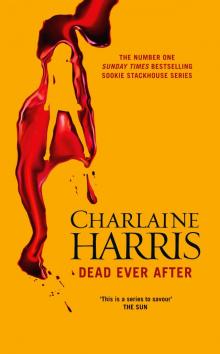 Dead Ever After
Dead Ever After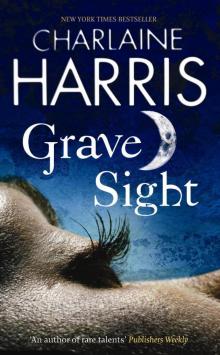 Grave Sight
Grave Sight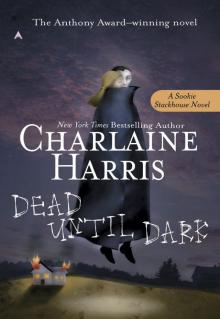 Dead Until Dark
Dead Until Dark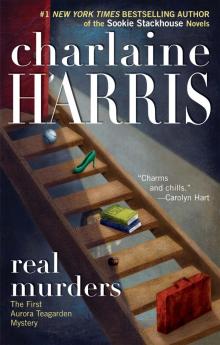 Real Murders
Real Murders Wolfsbane and Mistletoe
Wolfsbane and Mistletoe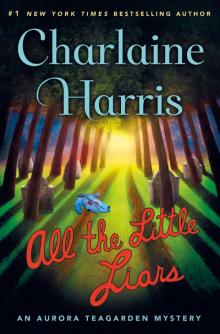 All the Little Liars
All the Little Liars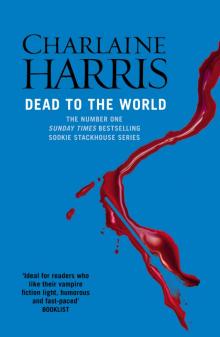 Dead to the World
Dead to the World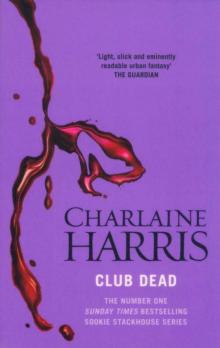 Club Dead
Club Dead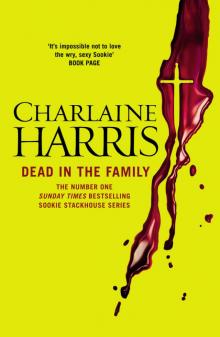 Dead in the Family
Dead in the Family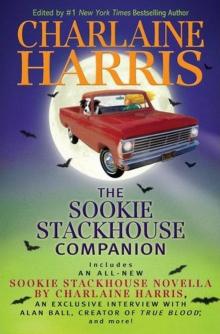 The Sookie Stackhouse Companion
The Sookie Stackhouse Companion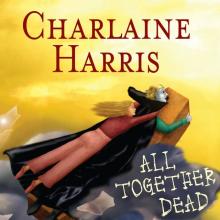 All Together Dead
All Together Dead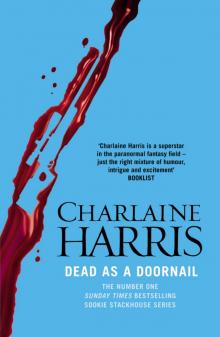 Dead as a Doornail
Dead as a Doornail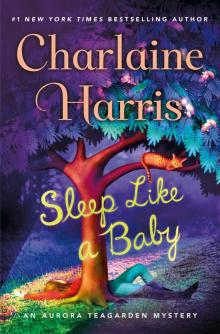 Sleep Like a Baby
Sleep Like a Baby Night Shift
Night Shift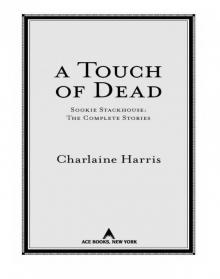 A Touch of Dead
A Touch of Dead Living Dead in Dallas
Living Dead in Dallas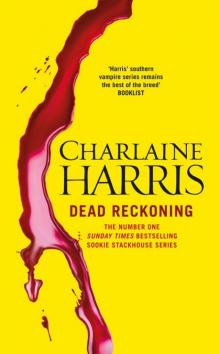 Dead Reckoning
Dead Reckoning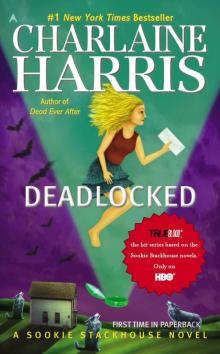 Deadlocked
Deadlocked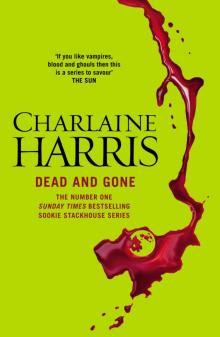 Dead and Gone
Dead and Gone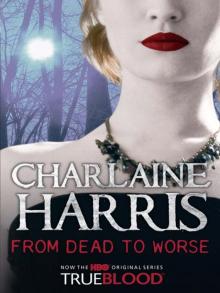 From Dead to Worse
From Dead to Worse Definitely Dead
Definitely Dead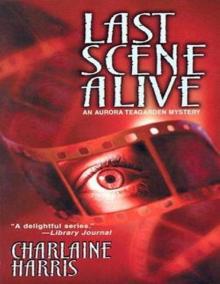 Last Scene Alive
Last Scene Alive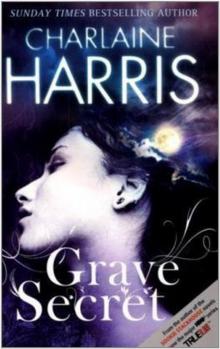 Grave Secret
Grave Secret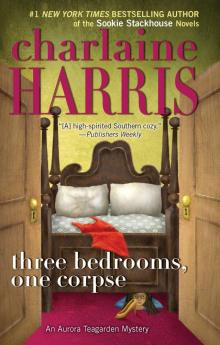 Three Bedrooms, One Corpse
Three Bedrooms, One Corpse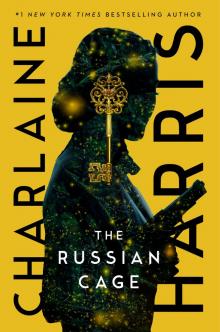 The Russian Cage
The Russian Cage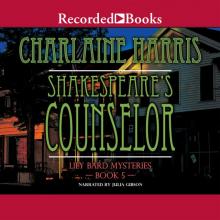 Shakespeares Counselor
Shakespeares Counselor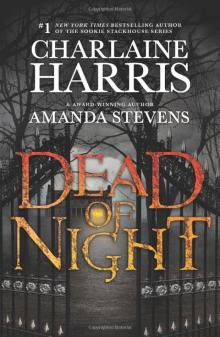 Dead of Night
Dead of Night Shakespeares Trollop
Shakespeares Trollop One Word Answer
One Word Answer Shakespeares Champion
Shakespeares Champion Shakespeares Christmas
Shakespeares Christmas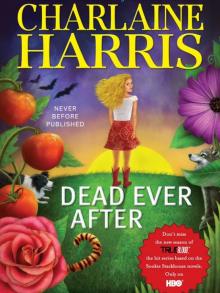 Shakespeares Landlord
Shakespeares Landlord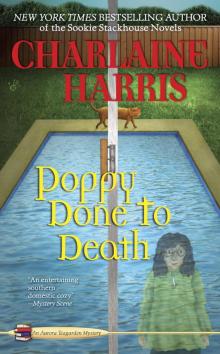 Poppy Done to Death
Poppy Done to Death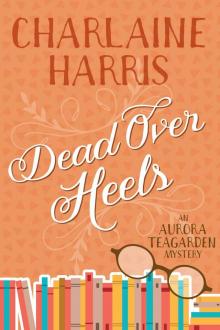 Dead Over Heels
Dead Over Heels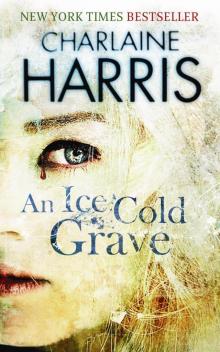 An Ice Cold Grave
An Ice Cold Grave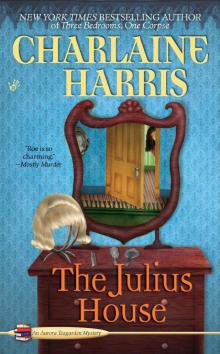 The Julius House
The Julius House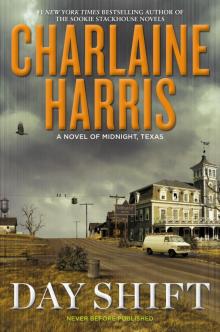 Day Shift
Day Shift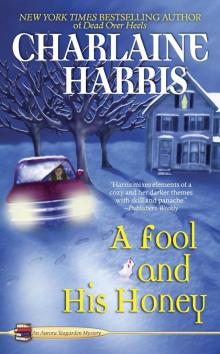 A Fool And His Honey
A Fool And His Honey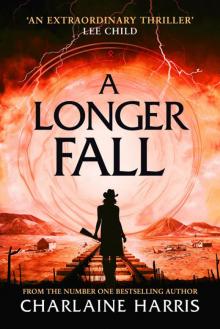 A Longer Fall (Gunnie Rose)
A Longer Fall (Gunnie Rose)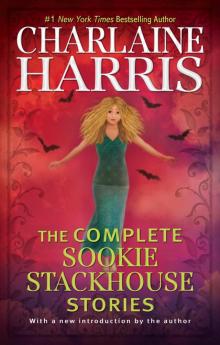 The Complete Sookie Stackhouse Stories (Sookie Stackhouse/True Blood)
The Complete Sookie Stackhouse Stories (Sookie Stackhouse/True Blood)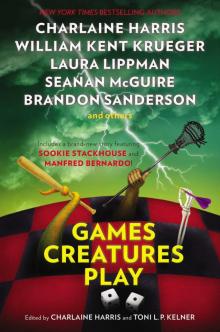 Games Creatures Play
Games Creatures Play Death's Excellent Vacation
Death's Excellent Vacation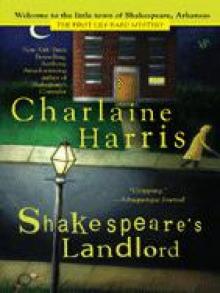 (LB2) Shakespeare's Landlord
(LB2) Shakespeare's Landlord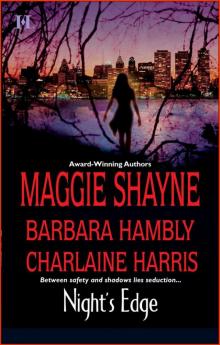 Dancers In The Dark - Night's Edge
Dancers In The Dark - Night's Edge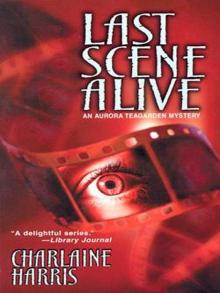 Last Scene Alive at-7
Last Scene Alive at-7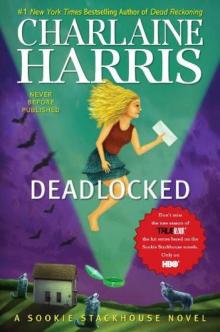 Deadlocked: A Sookie Stackhouse Novel
Deadlocked: A Sookie Stackhouse Novel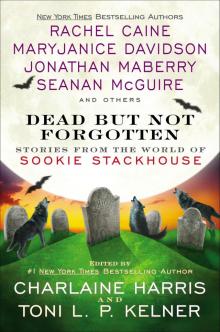 Dead But Not Forgotten
Dead But Not Forgotten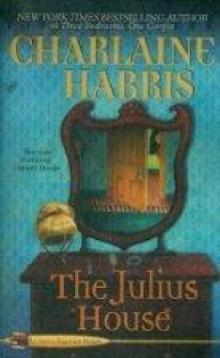 (4/10) The Julius House
(4/10) The Julius House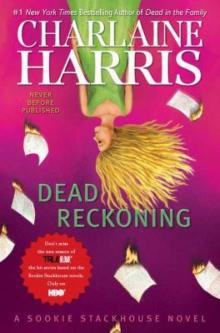 Dead Reckoning: A Sookie Stackhouse Novel
Dead Reckoning: A Sookie Stackhouse Novel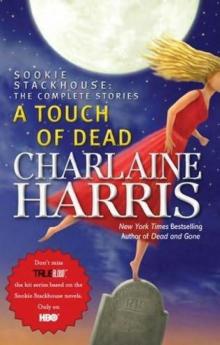 A Touch of Dead (sookie stackhouse (southern vampire))
A Touch of Dead (sookie stackhouse (southern vampire))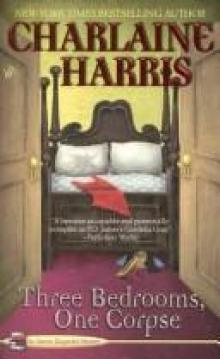 (3T)Three Bedrooms, One Corpse
(3T)Three Bedrooms, One Corpse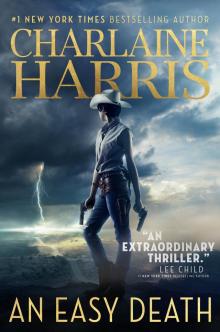 An Easy Death
An Easy Death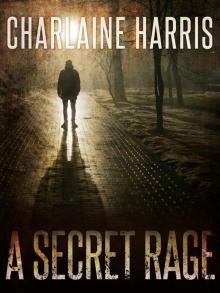 A Secret Rage
A Secret Rage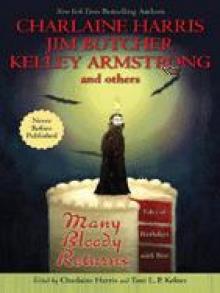 Many Bloody Returns
Many Bloody Returns![Harper Connelly [3] An Ice Cold Grave Read online](http://i1.bookreadfree.com/i/03/25/harper_connelly_3_an_ice_cold_grave_preview.jpg) Harper Connelly [3] An Ice Cold Grave
Harper Connelly [3] An Ice Cold Grave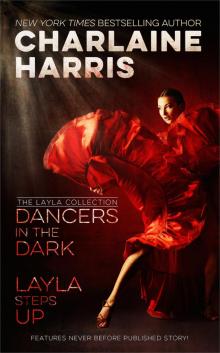 Dancers in the Dark and Layla Steps Up
Dancers in the Dark and Layla Steps Up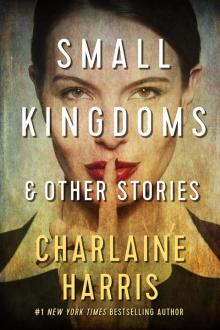 Small Kingdoms and Other Stories
Small Kingdoms and Other Stories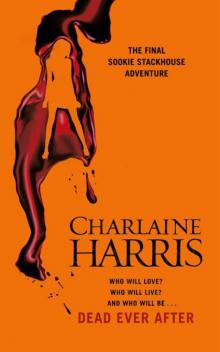 Dead Ever After: A Sookie Stackhouse Novel
Dead Ever After: A Sookie Stackhouse Novel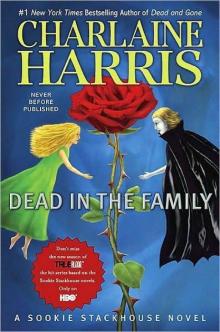 Dead in the Family ss-10
Dead in the Family ss-10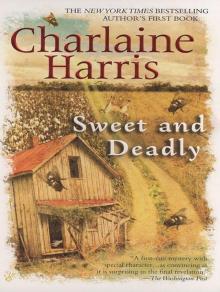 Sweet and Deadly aka Dead Dog
Sweet and Deadly aka Dead Dog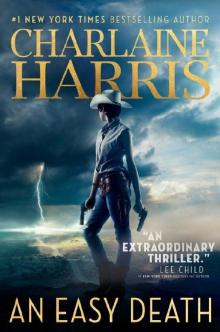 An Easy Death (Gunnie Rose #1)
An Easy Death (Gunnie Rose #1)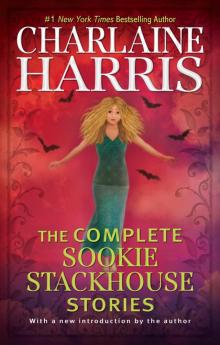 The Complete Sookie Stackhouse Stories
The Complete Sookie Stackhouse Stories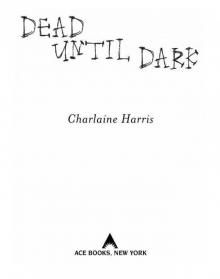 Sookie Stackhouse 8-copy Boxed Set
Sookie Stackhouse 8-copy Boxed Set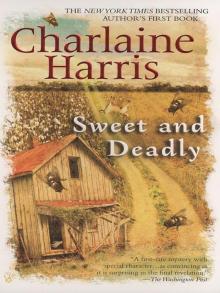 Sweet and Deadly
Sweet and Deadly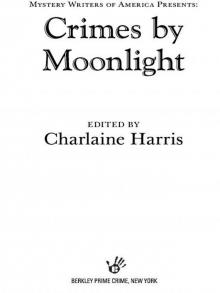 Crimes by Moonlight
Crimes by Moonlight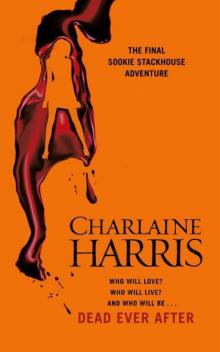 Dead Ever After: A True Blood Novel
Dead Ever After: A True Blood Novel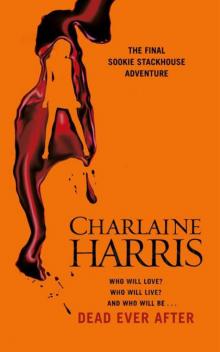 Dead Ever After ss-13
Dead Ever After ss-13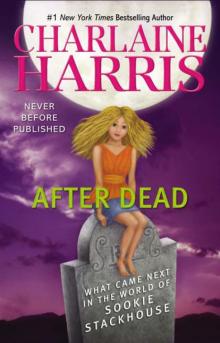 After Dead
After Dead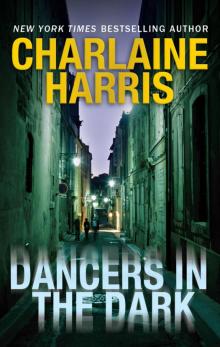 Dancers in the Dark
Dancers in the Dark (LB1) Shakespeare's Champion
(LB1) Shakespeare's Champion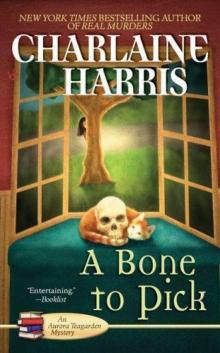 A Bone to Pick (Teagarden Mysteries,2)
A Bone to Pick (Teagarden Mysteries,2)